Overview
First impression of African Fish Eagle
The African Fish Eagle (Haliaeetus vocifer), a majestic symbol of the African wilderness, is known for its impressive appearance and formidable hunting prowess. As the main species in the Haliaeetus genus, this raptor boasts a distinctive brown body, a contrasting white head, and prominent black markings. Throughout sub-Saharan Africa, Haliaeetus vocifer captivates observers, embodying the untamed beauty of the region’s diverse ecosystems.
Curious about vibrant ostrich ?
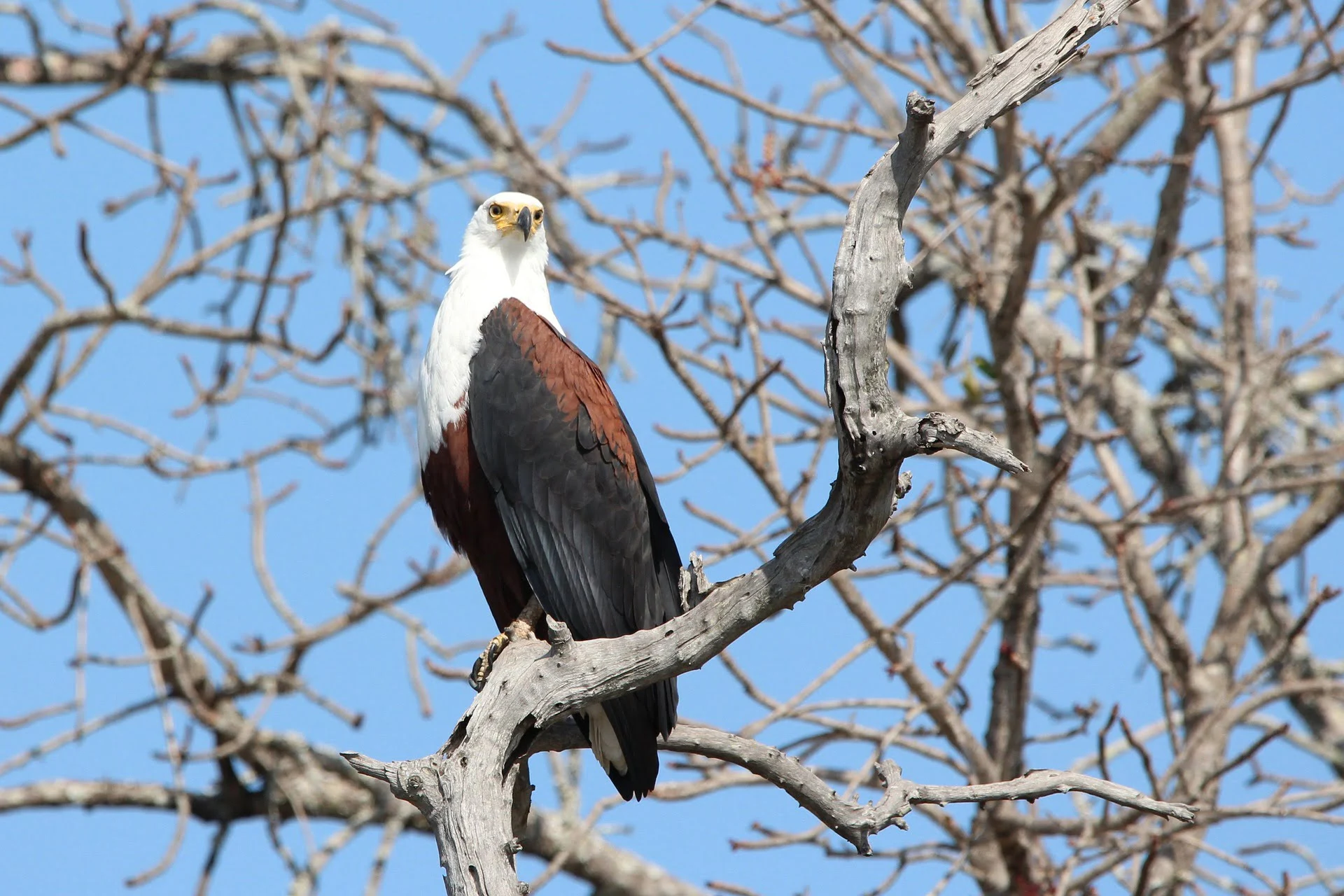

Appearance
How does African Fish Eagle look like ?
The African Fish Eagle (Haliaeetus vocifer) is a striking raptor with a distinctive appearance. Its large size and impressive wingspan, reaching up to 2.4 meters, make it a notable presence in African skies. The bird’s plumage is characterized by a brown body, a contrasting white head, and prominent black markings. Notably, it features white tail feathers and a hooked beak, contributing to its regal and formidable profile. The beak is large, powerful, and hooked, which is well-suited for its diet. The beak is also yellow with a black tip. The overall coloration and unique markings enhance its visibility and add to the bird’s striking visual appeal.
Life Span
12-40 Years
Weight
2-3.6 KG
Length
63-75 CM
Wingspan
1.7-2.1 Meter
Beak Size
6.5-8.5 CM
Tail Length
28-33 CM
Diet and Feeding Habits
What African Fish Eagle like to eat?
The African Fish Eagle is a skilled predator with a primary diet centered around fish. Its hunting technique involves soaring over lakes, rivers, and wetlands, where it uses its keen eyesight to spot fish near the water’s surface. Once a target is identified, the eagle executes a precise dive, extending its powerful talons to snatch fish from the water.
While fish comprise the majority of its diet, the African Fish Eagle is opportunistic and may also feed on birds, small mammals, or carrion when fish are scarce. This adaptability enables the eagle to thrive in a range of environments, making it a versatile and successful predator in the African wilderness.

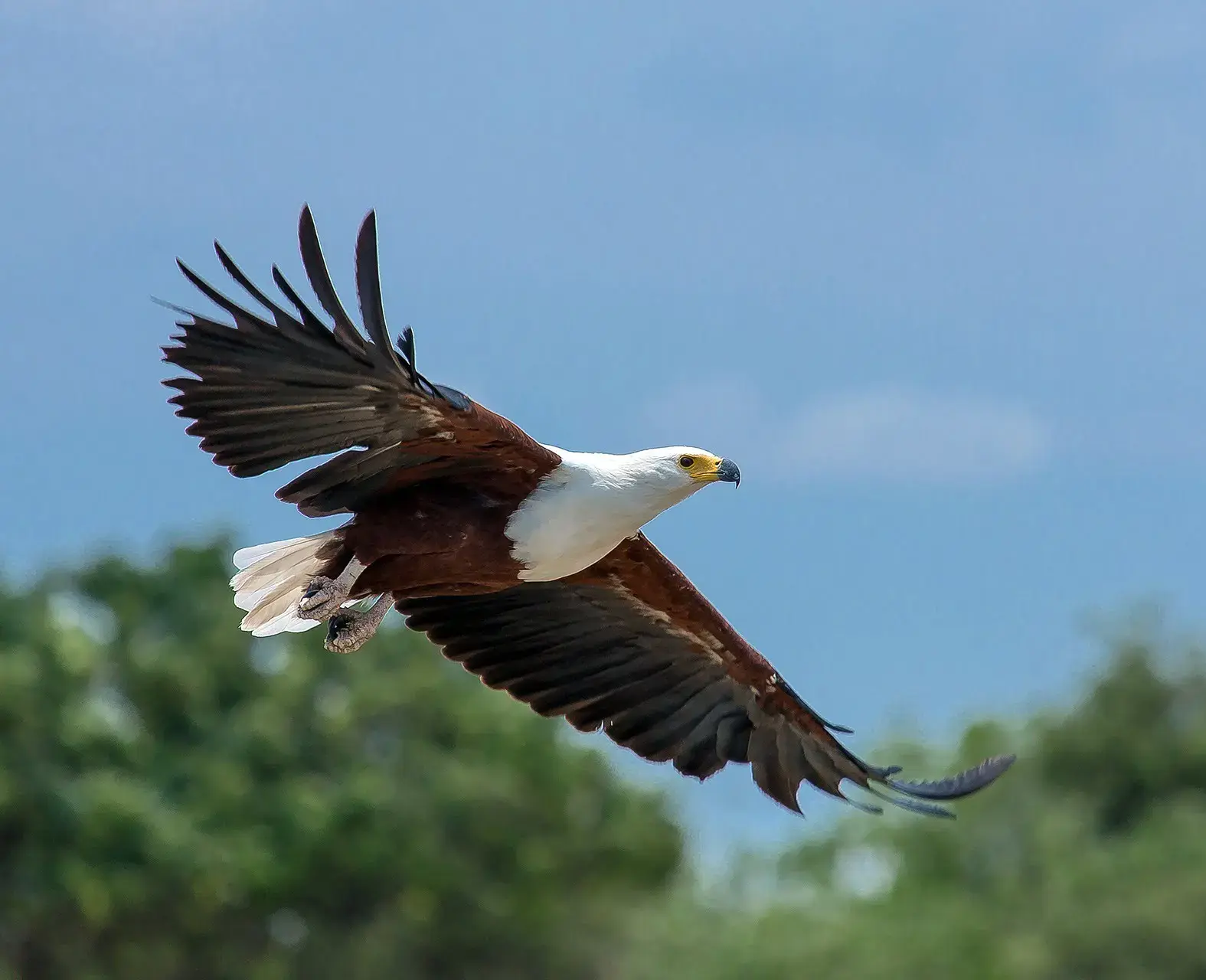
Habitat and Distribution
Where you can find African Fish Eagle?
He loves hanging out near freshwaters across sub-Saharan Africa. You will spot them by lakes, rivers, dams, and coastal estuaries, diving into these watery havens for their favorite meal, fish! These eagles are pretty cool, they can thrive in all sorts of wetland. You can find them in the amazing Masai Mara National Reserve, the vast Serengeti National Park and even around the beautiful Lake Nakuru.
Speaking of range, these birds are like the jet-setters of the avian world. They’re all over, from the southern tip of Africa to the Sahara Desert and the Nile River. But you won’t find them in arid spots or dense forests, they prefer wide-open water spaces.
Fun fact about African Fish Eagle
They are the national bird of four African countries: Malawi, Namibia, Zambia, and Zimbabwe.
They are an apex predator: Their diet consists mainly of fish, but they will also eat other aquatic animals, such as snakes, frogs, and turtles.
They are monogamous: Pairs stay together for life and raise their young together.
They have a long lifespan: African fish eagles can live up to 40 years in the wild.
Migration Pattern
The African Fish Eagle is generally non-migratory, meaning it tends to stay in its home range throughout the year. However, there can be local movements driven by factors such as seasonal changes, availability of food, or alterations in water levels.
While many African Fish Eagles remain in their established territories, some individuals may exhibit limited movements in search of optimal fishing grounds. These movements are not as extensive as the long-distance migrations observed in some bird species. The eagles’ adaptability allows them to adjust to local variations in their habitat, ensuring a steady supply of their preferred prey, fish.
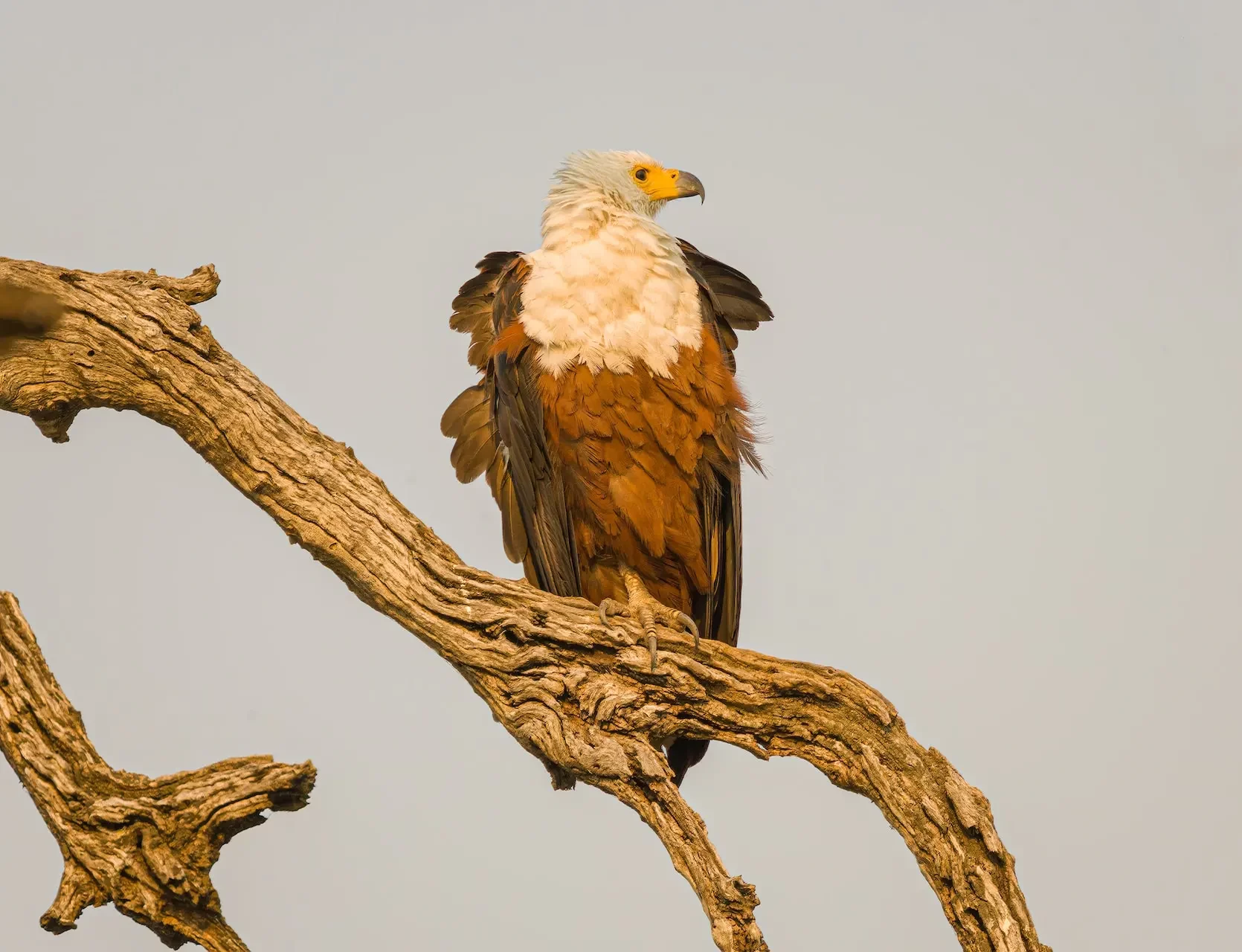
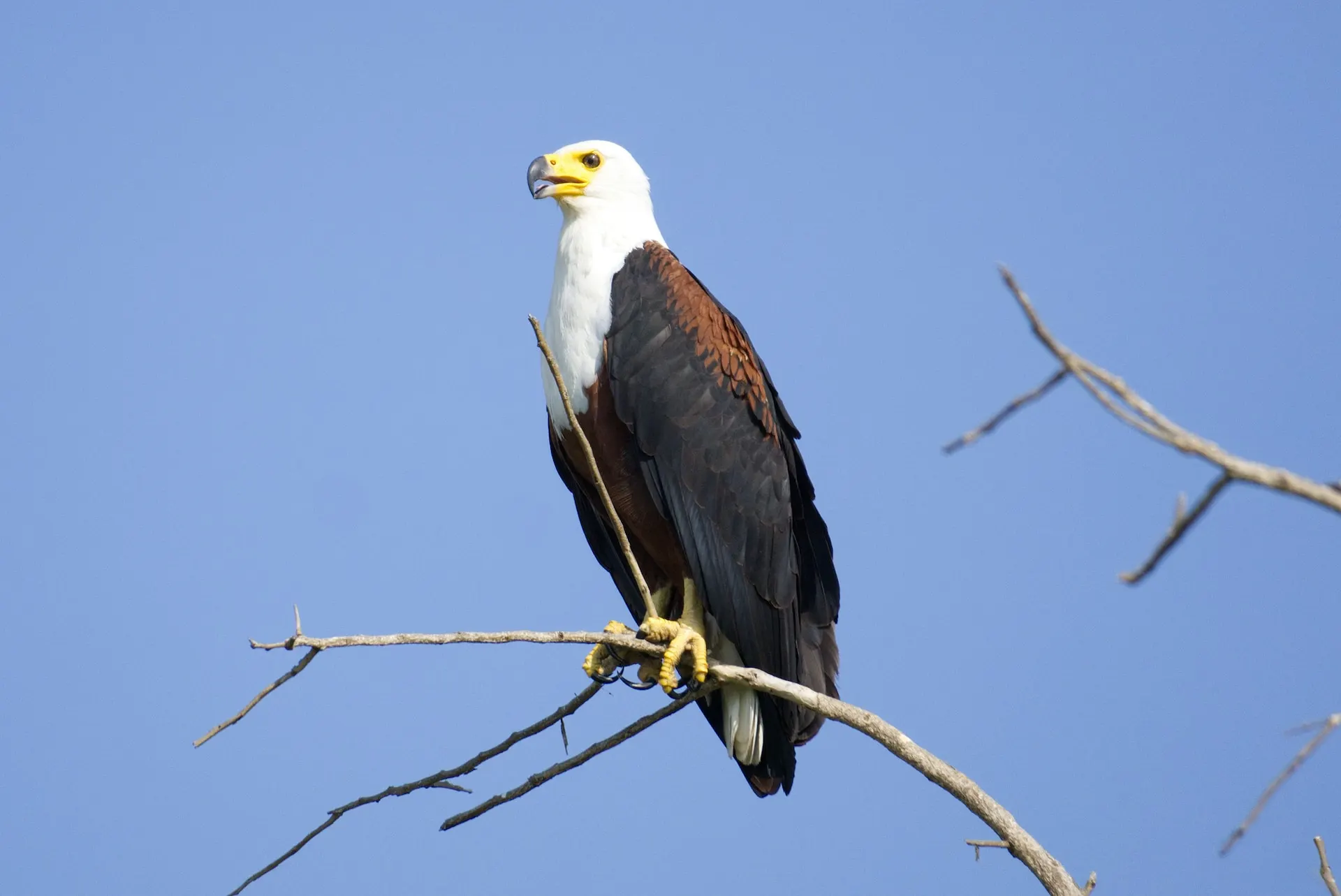
Vocalization Insights
The African Fish Eagle is famous for its distinctive vocalizations that resonate across the African wilderness. Its most iconic sound is a loud, ringing call, often described as a “kweeeer” or “weee-ah” that echoes over lakes and rivers.
These calls serve various purposes, including marking territory, communicating with mates, and signaling their presence to potential rivals. The vocalizations of African Fish Eagles are not only a means of communication but also contribute to the bird’s charismatic and recognizable presence in their habitats.
Cultural Significance
In Namibia and Zambia, the African Fish Eagle is a national symbol, embodying strength, freedom, and the natural beauty of these nations. The bird’s association with waterways and its impressive hunting abilities contribute to its revered status in local traditions.
In addition to being a symbol of national pride, the African Fish Eagle is often featured in African art, literature, and proverbs, further cementing its cultural significance. Its iconic call is not only a characteristic sound of the African wilderness but also a symbol woven into the fabric of African heritage, reflecting the deep connection between people and the natural world.
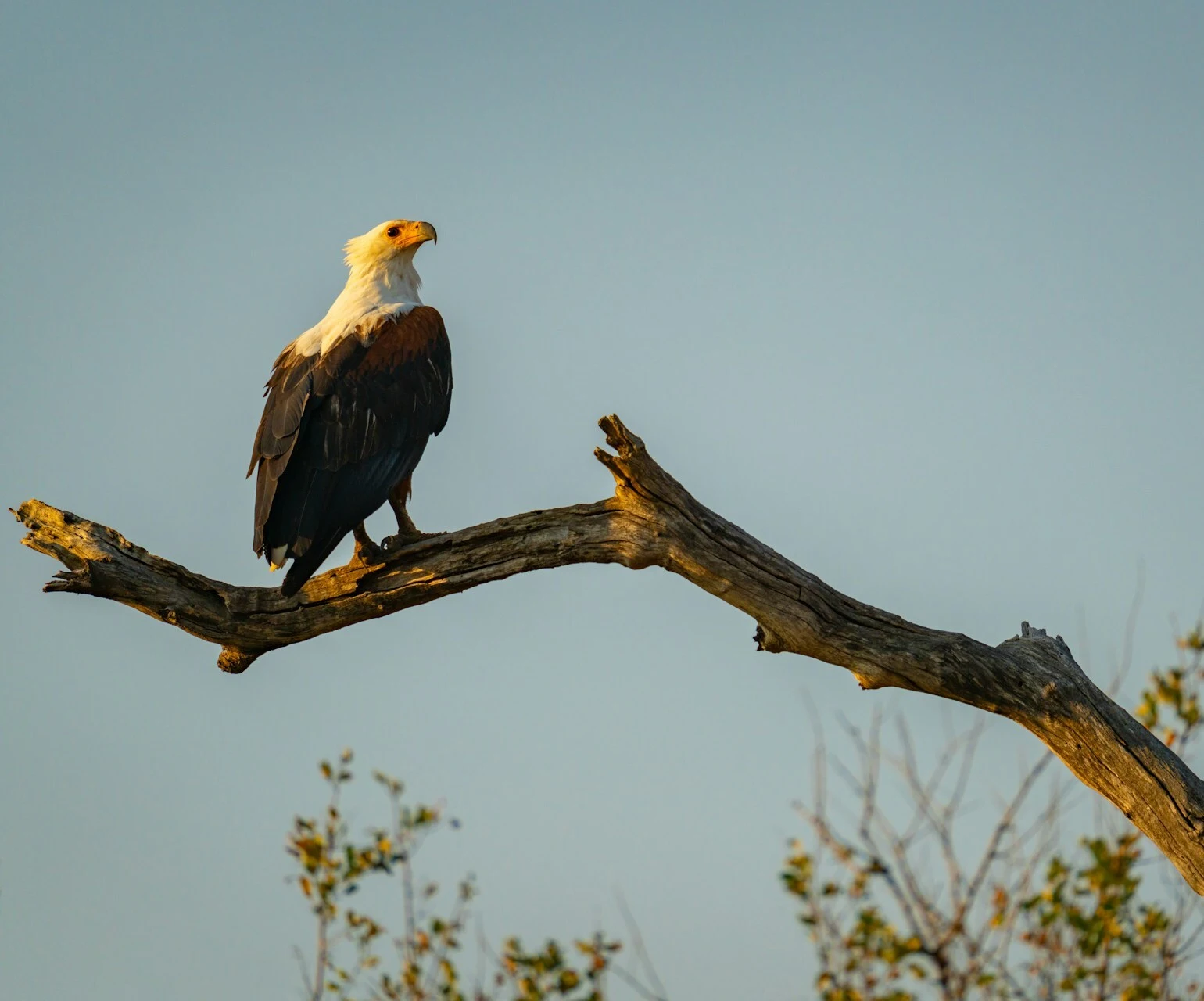
Waterfront Locations
Focus your observations around freshwater habitats, including lakes, rivers, dams, and coastal estuaries. These areas are the primary hunting grounds for the African Fish Eagle.
Look for High Perches
Scan elevated positions, such as tall trees or rocky outcrops near water bodies. African Fish Eagles prefer these vantage points for hunting and keeping a watchful eye on their surroundings.
Early Mornings and Late Afternoons
Plan your observations during the early mornings or late afternoons. These are peak activity times for the eagles, increasing the likelihood of witnessing their impressive hunting displays.
Distinctive Calls
Familiarize yourself with the eagle’s distinctive calls. Recognizing its vocalizations can help you locate and identify the bird even before spotting it visually.
Ready to spot African Fish Eagle? Reach our team.
Frequently Asked Questions
Where do African fish eagles live?
African fish eagles are found throughout sub-Saharan Africa, inhabiting a variety of freshwater habitats, including lakes, rivers, swamps, and dams. They prefer open areas with abundant fish populations and tall trees for nesting.
What do African fish eagles eat?
As their name suggests, African fish eagles are primarily fish-eaters. They have powerful talons and sharp beaks adapted for catching and consuming fish of various sizes. They also occasionally prey on other aquatic creatures like amphibians, reptiles, and waterbirds.
How do African fish eagles hunt?
African fish eagles are skilled hunters, utilizing various techniques to capture their prey. They often soar high above the water’s surface, scanning for potential targets. Once they spot a suitable fish, they dive swiftly towards the water, their powerful talons outstretched to snatch their catch. They may also perch on branches overhanging water, waiting for unsuspecting fish to pass below.
Are African fish eagles social birds?
African fish eagles are generally solitary birds, except during the breeding season when they form monogamous pairs. They maintain their territories throughout the year, aggressively defending them from intruders.
How do I book safari with Big Cats Safari?
Booking a safari with us is a straightforward process. Simply visit our website, select your preferred destination and safari package, and follow the step-by-step booking instructions provided. It’s quick and easy.
